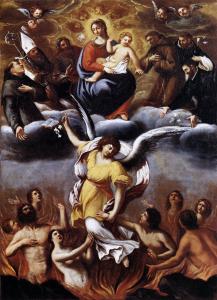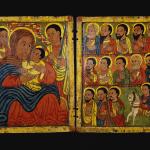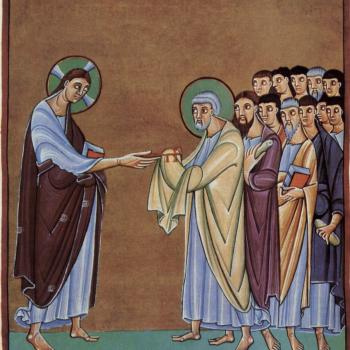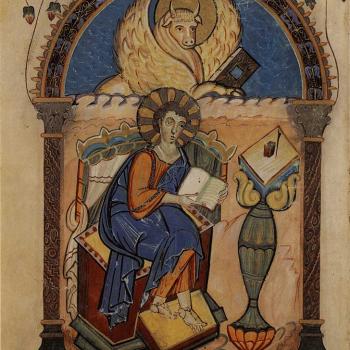
Introduction:
In a previous article, I laid the groundwork for the introduction of a brief citation from Mark of Ephesus’ (d. 1444) First Homily: Refutation of the Latin Chapters Concerning Purgatorial Fire. There also was given some brief biographical information on the Metropolitan of Ephesus, and a general context of the text that will be analyzed in the present post. As previously indicated, Mark is answering a Latin probe into the Greek understanding of the “middle-state” during preliminary discussions on that subject at the Council of Florence (A.D. 1438). Also, the initial presentation of the Latin conception was almost entirely based upon the Profession of Faith of Michael Palaeologus, from the Second Council of Lyons (A.D. 1272-74).[1]
The First Homily:
The work appears to be structured in response to a series of propositions which positively present the Latin doctrine.[2] In the first chapter, Mark is responding to the idea that:
“If those who truly repent have departed this life in love (towards God) before they were able to give satisfaction by means of worthy fruits for their transgressions or offenses, their souls are cleansed after death by means of purgatorial sufferings; but for the easing (or ‘deliverance’) of them from these sufferings, they are aided by the help which is shown them on the part of the faithful who are alive, as for example: prayers, Liturgies, almsgiving, and other works of piety”.
In his reply, Mark affirms that those who have departed in friendship with God are indeed helped by the aforementioned “works of piety”. Such is consistent with the ancient custom and the writings of the Early Church Fathers in his estimation. “But that souls are delivered thanks to a certain purgatorial suffering and temporal fire which possesses such (a purgatorial) power and has the character of a help —”, he objects, “this we do not find either in the Scriptures or in the prayers and hymns for the dead, or in the words of Teachers”. He goes on to state his belief that the aforementioned “works of piety” are efficacious in bringing temporary relief to the souls in Hell, citing an anecdote of Macarius of Egypt (d. A.D. 391), and a prayer from Basil the Great (d. A.D. 379). He then states the following:
“But if souls have departed this life in faith and love, while nevertheless carrying away in themselves certain faults, whether small ones over which they have not repented at all, or great ones for which—even though they have repented over them—they did not undertake to show fruits of repentance: such souls, we believe, must be cleansed from this kind of sins, but not by means of some purgatorial fire or a definite punishment in some place…. But some must be cleansed in the very departure from the body, thanks only to fear, as St. Gregory the Dialogist literally shows; while others must be cleansed after the departure from the body, either while remaining in the same earthly place, before they come to worship God and are honored with the lot of the blessed, or—if their sins were more serious bind them for a longer duration—they are kept in hell, but not in order to remain forever in fire and torment, but as it were in prison and confinement under guard”.[3]
Here we can pause and highlight some of the similarities and differences between the respective Latin and Greek conceptions of the afterlife at this time (ca. A.D. 1438). First, Mark seems to accept the concept of venial “faults” remaining that individuals may remain guilty of post-mortem, and/or “faults” remaining due to bringing forth insufficient “fruits of repentance” for graver sins. In the Latin conception, a distinction is made between the guilt that is due to sin and the temporal punishments that remain once grave (post-baptismal) sins have been forgiven, or that are due to unconfessed venial sins. These temporal punishments and the removal of attachment to sins are part of the Western view of final purification, known as Purgatory. While the Metropolitan of Ephesus admits that souls in such a state must be purified after leaving the body (or in the action of doing so per St. Gregory the Dialogist), he disagrees with the process as laid out by the Latins, namely, the idea of “some purgatorial fire or a definite punishment in some place”.[4] What is more, as Joseph Gill indicates, Mark “does not admit the debt of temporal punishment due also to sins forgiven that the Latins hold to be one of the main reasons for a Purgatory”.[5] Nevertheless, the Metropolitan of Ephesus still expresses the need for a post-mortem purification in certain instances.
Apart from the idea of a literal fire, Mark was also hung up on the idea of a final purification as occurring “in some place”. Although the idea of Purgatory as a “place” is common, it is not actually part of the dogma.[6] Moreover, at the Council of Florence the idea of a literal purifying fire was not imposed on the Greeks, even though such an understanding existed in the West.[7] As such, the Bull of Union with the Greeks (Laetentur caeli), proclaimed at Florence on July 6, 1439, reads as follows on the subject of Purgatory:
“Likewise, 〈we define〉that if those who are truly penitent die in the love of God before having satisfied by worthy fruits of penance for their sins of commission and omission, their souls are cleansed after death by purgatorial punishments. In order that they be relieved from such punishments, the acts of intercession of the living faithful benefit them, namely, the sacrifices of the Mass, prayers, alms, and other works of piety that the faithful are wont to do for the other faithful according to the Church’s practice” (Denzinger 1304).[8]
There is no mention of “fire” in the above formulation of Purgatory. Rather, a reference is made to a final purification (post-mortem) via “purgatorial punishments”. The same may be said for the teaching on Purgatory expressed in the Profession of Faith of Michael Palaeologus, from the Second Council of Lyons (A.D. 1272-74).[9] Moreover, the Council of Trent says nothing of a literal fire either (A.D. 1563).[10] This appears to have allowed contemporary Latin Theologians to speculate some. Referencing 1 Corinthians 3:12-15, Pope Emeritus Benedict XVI wrote in his encyclical Spe salvi: “Some recent theologians are of the opinion that the fire which both burns and saves is Christ himself, the Judge and Saviour.”[11] Perhaps this opinion would have found more favor with the Metropolitan of Ephesus?
[1] Joseph Gill, The Council of Florence (Cambridge: Cambridge University Press, 1959), 118-120. Cf. Fr. Seraphim Rose, The Soul After Death: Contemporary “After-Death” Experiences in the Light of the Orthodox Teaching on the Afterlife (Platina: St. Herman of Alaska Brotherhood, 2020), 197.
[2][2] Cf. Gill, , The Council of Florence, 119; Rose, The Soul After Death, 196.
[3] Excerpts taken from Mark of Ephesus, First Homily, in Rose, The Soul After Death, 199-201.
[4] Cf. Gill, Council of Florence, 121, 123.
[5] Gill, Council of Florence, 125.
[6] Cf. the Catholic Answers tract “What the Early Church Believed: Purgatory”. https://www.catholic.com/tract/the-roots-of-purgatory (accessed 10/30/2022).
[7] Edward Hanna, “Purgatory.” The Catholic Encyclopedia Vol. 12. (New York: Robert Appleton Company, 1911). <http://www.newadvent.org/cathen/12575a.htm>. Accessed 10/30/2022.
[8] Heinrich Denzinger, Compendium of Creeds, Definitions, and Declarations on Matters of Faith and Morals, ed. Peter Hunermann (San Francisco: Ignatius Press, 2012), 335-336.
[9] So it appears to the present author at least. Contrarily, Ludwig Ott affirms that “the Union Councils of Lyons and of Florence uphold the purifying fire and the expiatory character of the penal sufferings”. In Ludwig Ott, “Fundamentals of Catholic Dogma, ed. James C. Bastible, trans. Patrick Lynch (Rockford: Tan Books and Publishers, 1974), 483.
[10] See Decree Concerning Purgatory (Twenty-Fifth Session). In The Canons and Decrees of the Council of Trent, trans. H.J. Schroeder (Charlotte: Tan Books, 1978), 217-218.
[11] Benedict XVI, Spe salvi, ch. 47.













